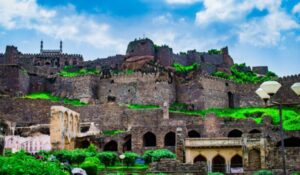Golconda Fort – Hyderabad :
Golconda Fort (also known as Golla Konda) is a fortified citadel in Hyderabad, Telangana, India, built by the Qutub Shahi Kings. It has an amazing structure, with eight gates and 87 bastions. The architectural marvel Golconda Fort, located just 11 kilometres from the capital, is well connected to the rest of the city.
Golconda Fort History:
Shepherd’s Hill was its original name (Golla Konda in Telugu). A shepherd child, according to folklore, found an idol on this rocky hill. The news was passed on to the governing Kakatiya ruler, who built a mud fort around the holy site. The fort was taken over by Bahamani kings after 200 years. Golconda gradually grew to prominence under the Bahmani Sultanate. Around 1501 Sultan Quli Qutb-ul-Mulk (r. 1487–1543), a Bahmanid governor sent to Golconda, founded the city as the seat of his government. During this time, Bahmani power declined, and Sultan Quli (Quli Qutub Shah era) declared independence in 1538, establishing the Qutb Shahi dynasty in Golconda.
The first three Qutb Shahi sultans developed the mud fort into the current edifice, a vast granite stronghold reaching roughly 5 kilometres (3.1 mi) in circle, over a period of 62 years. The capital of the Qutb Shahi dynasty existed here until 1590, when it was moved to Hyderabad. The fort was extended by the Qutb Shahis, who built a 7-kilometer (4.3-mile) outer wall that encircled the city.
Golconda Fort Architecture:
Golconda is made up of four forts connected by a 10 km (6.2 mi) long outer wall with 87 semicircular bastions (some still with cannons), eight entrances, and four drawbridges, as well as royal residences, halls, temples, mosques, stores, stables, and other structures. The lowest of them is the outermost enclosure, which is approached via the “Fateh Darwaza” on the south-eastern corner, which is studded with enormous iron spikes (to prevent elephants from battering them down). At Fateh Darwazaan, a hand clap at the entry dome reverberates and can be heard clearly at the ‘Bala Hisar’ pavilion, the highest point over a kilometre away. In the event of an attack, this served as a warning.
The Bala Hissar Gate, on the fort’s eastern side, is the primary entrance. It has a pointed arch with rows of scroll work around it. Yalis and embellished roundels adorn the spandrels. Peacocks with intricate tails surround an attractive arched niche in the region above the door. Sculpted yalis flank a disc on the granite block lintel below. Peacocks and lions are common in Hindu architecture, which explains the fort’s Hindu origins.
Toli Masjid was erected in 1671 by Mir Musa Khan Mahaldar, the royal architect of Abdullah Qutb Shah, and is located in Karwan, about 2 kilometres (1.2 miles) from the Golconda Fort.
Five arches make up the facade, each with lotus medallions in the spandrels. The centre arch is a little bigger and more elaborate than the others. Inside the mosque, there are two halls: a transverse outer hall and an inner hall with triple arches.
It is thought that a secret tunnel runs from the “Durbar Hall” to one of the palaces at the bottom of the hill.
The tombs of the Qutub Shahi kings can also be found in the fort. These graves, which have Islamic construction, are around 1 km (0.62 mi) north of Golconda’s outer wall. Beautiful gardens surround them, as well as countless carved stones. There was also a rumour that Charminar had a secret tunnel.
Golconda Fort Timings:
9.00 am to 5.30 pm
Golconda Fort Entry Fees:
For Indians, the cost is Rs.25 per person.
For foreign tourists, the cost is Rs.300 per person.
For Camera (25 Rupees)
Golconda Fort Address: Golconda Fort, Ibrahim Bagh, Hyderabad, Telangana, 500008, India
Golconda Fort Images:

